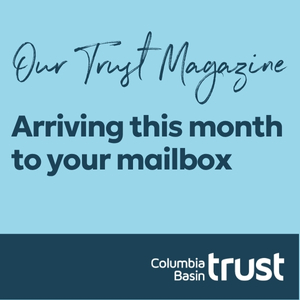
As part of the City of Fernie’s invasive plant management plan and in response to concerns from residents regarding invasive plant infestations within the city of Fernie, the East Kootenay Invasive Species Council (EKISC) hosted an Open House on October 30th to showcase some of the work that has been recently completed. West Fork Resource Management (WFRM), Vahana Nature Rehabilitation, the Regional District of East Kootenay (RDEK), and the City of Fernie all presented their progress and roles in the work that has been done to adhere to a recently implemented invasive plant management plan.
Invasive species are plants or animals that are not native to this province, or are outside of their natural range. They can disrupt habitat, displace native species and negatively impact British Columbia’s environment, people or economy. Invasive plants, for example, can reduce biodiversity, increase soil erosion, alter soil chemistry, adversely affect commercial crops, and destroy the places we recreate in. Some may even pose a health risk to animals and humans.
“Once invasive species become established, they can spread rapidly, and seriously disrupt our ecosystems, economy, or society if left unchecked,” said Jessie Paloposki, EKISC’s Education and Communications Manager, “The close partnerships local government has developed with the East Kootenay Invasive Species Council and the new integrated plan that West Fork Resource Management has developed will go a long way toward managing these harmful species.”
The current plan, an upgrade from 2014, based on findings from a 2017 city-wide invasive plant inventory, ensures a renewed commitment to effectively manage invasive species in the city for the next 3-5 years. In 2017 West Fork Resource Management conducted a full inventory of city lands which included 191 sites and identified 18 invasive plant species. Each site was then categorized into differing priorities from 1 – 3 depending on the species and site-specific risk factors.
In 2018, treatment of priority one and two sites began; 134 of the sites were treated using a combination of herbicide, clipping, and pulling treatments. This year, 128 sites were treated, and monitoring of previously treated sites began; in addition, 17 new sites were identified and treated. This season, there was also a focus on more public awareness and education. EKISC helped organize a community weed pull and riverside restoration event and delivered informational handouts at Fernie Mountain markets; the City of Fernie placed ads in newspapers and made updates to their social media sites; and colourful new signage was placed in areas to be treated with herbicide.
The updated 2017 plan builds on the original strategy released in 2014, and focuses on five key objectives:
● Reduce the negative impacts of invasive plant species through balanced management consistent with legislation, community values, and environmental protection
● Apply best practices to maintain balance in our ecosystems
● Minimize the use of herbicides by using an integrated approach
● Use preventative strategies to stop new invaders and infestations
● Manage invasive plants without compromising the health of humans and native ecosystems
So far, 2019 has seen significant reduction in weed densities, meaning that the chemical treatments in 2018 were effective. Twenty-two sites treated in 2018 were free from invasive plant species, leaving more resources to treat additional sites; annual monitoring will continue to take place in areas where no invasive species were found.
A targeted grazing pilot project was also launched in 2019. Vahana Nature Rehabilitation was contracted to graze a herd of 200 goats through 6 target areas within the Railway Dog Park. A total of 1.17 hectares were grazed over 4 days. The project significantly reduced vegetation density, and it is proposed that areas will continue to be monitored in 2020 for efficacy. Success of this program will require long-term integrated management and continued funding.
By working together, residents can help stop the spread of invasive species that can damage the city environment, infrastructure, and economy. EKISC reminds us that we can report invasive species using the Report-A-Weed app, and we can get involved by attending events throughout the year.
“We thank the City for working with West Fork Resource Management to reinstate an invasive plant management plan, and for encouraging the residents of Fernie to get involved,” said Jessie Paloposki. “And we thank all those who came out to the Open House on October 30th. We can all be stewards of our local landscape and a collaborative effort is what is required to improve Fernie’s green spaces and ecosystems and prevent further impacts from these invasive species.”
See a Facebook Live recording of the open house here.


























